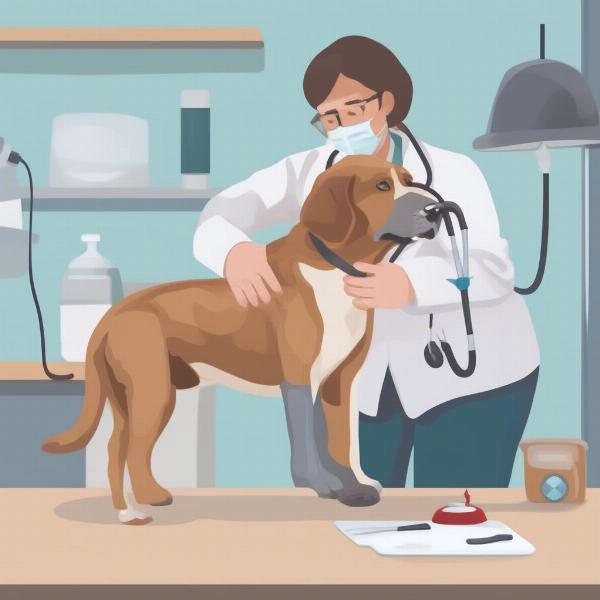Coneflowers, with their vibrant petals and cheerful disposition, are a common sight in many gardens. But if you’re a dog owner, you might be wondering: are these beautiful blooms a danger to my furry friend? The short answer is: it depends. While coneflowers aren’t generally considered highly toxic to dogs, they can still cause some unpleasant reactions if ingested. Understanding the potential risks and taking preventative measures can help keep your canine companion safe.
Coneflowers belong to the Echinacea family, some species of which are used in herbal remedies to boost the immune system. However, the same compounds that offer potential health benefits to humans can cause digestive upset in dogs. This can manifest as vomiting, diarrhea, drooling, or loss of appetite. Some dogs may also experience allergic reactions, such as skin irritation or facial swelling. While these reactions are usually mild, it’s essential to monitor your dog closely if they’ve nibbled on a coneflower.
Understanding the Risks of Coneflowers for Dogs
The level of toxicity varies depending on the species and the amount ingested. Younger dogs and smaller breeds are also more susceptible to adverse effects. While serious complications are rare, it’s always best to err on the side of caution.
The primary concern with coneflowers is the potential for gastrointestinal upset. If your dog consumes a large quantity of coneflower petals, leaves, or stems, they may experience vomiting and diarrhea. These symptoms are typically self-limiting and resolve within a few days. However, prolonged vomiting and diarrhea can lead to dehydration, which can be dangerous, especially for puppies and senior dogs.
Preventing Coneflower Ingestion
The best way to prevent coneflower toxicity in dogs is to keep them out of reach. If you have coneflowers in your garden, consider fencing off the area or using other deterrents to keep your dog away. Training your dog to “leave it” can also be incredibly helpful in preventing them from munching on potentially harmful plants.
What to Do If Your Dog Eats a Coneflower
If you suspect your dog has ingested a coneflower, contact your veterinarian immediately. They can advise you on the best course of action based on your dog’s breed, size, and the amount ingested. Keep a close eye on your dog for any signs of illness, such as vomiting, diarrhea, lethargy, or loss of appetite.
My dog ate a coneflower, should I induce vomiting?
Inducing vomiting should only be done under the guidance of a veterinarian. While it might seem like a good idea to get the plant out of your dog’s system quickly, inducing vomiting incorrectly can cause more harm than good. Your veterinarian can determine if inducing vomiting is necessary and advise you on the safest way to do so.
 Veterinarian examining a dog
Veterinarian examining a dog
Creating a Dog-Friendly Garden
While coneflowers pose a mild risk to dogs, many other common garden plants are highly toxic. Researching and choosing dog-friendly plants can help ensure your garden is a safe haven for both your plants and your furry companion. Consider alternatives like sunflowers, zinnias, and marigolds, which add vibrant color without posing a threat to your dog.
Conclusion
Coneflowers, while beautiful, can pose a mild risk to dogs if ingested. By understanding the potential risks and taking preventative measures, you can help ensure your canine companion stays safe and healthy. If your dog does eat a coneflower, contact your veterinarian immediately for advice. Creating a dog-friendly garden with non-toxic plants is the best way to ensure your furry friend can enjoy the outdoors without worry.
FAQ
- Are all coneflowers toxic to dogs? While not all coneflowers are highly toxic, they can still cause digestive upset and allergic reactions in dogs.
- What are the symptoms of coneflower poisoning in dogs? Symptoms may include vomiting, diarrhea, drooling, loss of appetite, skin irritation, and facial swelling.
- What should I do if my dog eats a coneflower? Contact your veterinarian immediately for advice.
- How can I prevent my dog from eating coneflowers? Keep coneflowers out of reach, train your dog to “leave it,” and consider planting dog-friendly alternatives in your garden.
- Are there any dog-friendly alternatives to coneflowers? Yes, sunflowers, zinnias, and marigolds are safe and colorful options for your garden.
ILM Dog is your trusted source for expert advice on dog care and wellbeing. We offer a comprehensive range of resources, from breed selection and puppy care to senior dog health and training tips. Our team of experienced writers and dog experts is dedicated to providing accurate and practical information to help you navigate every stage of your dog’s life. For more valuable insights and personalized advice, contact us today at [email protected] or call us at +44 20-3965-8624. ILM Dog provides expert guidance on Dog Breeds, Health & Medical Care, Training & Behavior, Nutrition & Feeding, Grooming & Hygiene, and Products & Accessories. Let us help you provide the best possible care for your beloved canine companion.